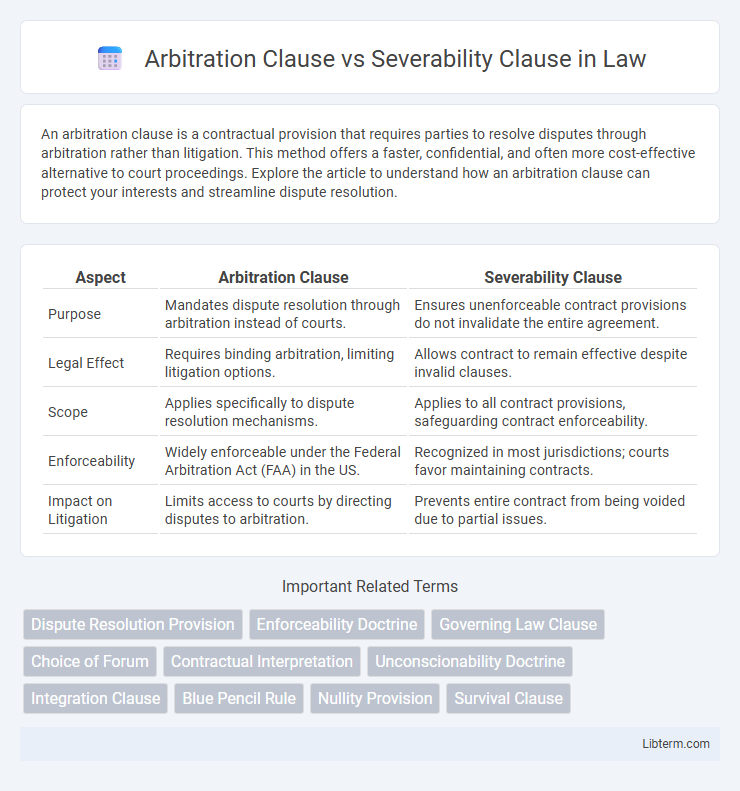An arbitration clause is a contractual provision that requires parties to resolve disputes through arbitration rather than litigation. This method offers a faster, confidential, and often more cost-effective alternative to court proceedings. Explore the article to understand how an arbitration clause can protect your interests and streamline dispute resolution.
Table of Comparison
| Aspect | Arbitration Clause | Severability Clause |
|---|---|---|
| Purpose | Mandates dispute resolution through arbitration instead of courts. | Ensures unenforceable contract provisions do not invalidate the entire agreement. |
| Legal Effect | Requires binding arbitration, limiting litigation options. | Allows contract to remain effective despite invalid clauses. |
| Scope | Applies specifically to dispute resolution mechanisms. | Applies to all contract provisions, safeguarding contract enforceability. |
| Enforceability | Widely enforceable under the Federal Arbitration Act (FAA) in the US. | Recognized in most jurisdictions; courts favor maintaining contracts. |
| Impact on Litigation | Limits access to courts by directing disputes to arbitration. | Prevents entire contract from being voided due to partial issues. |
Introduction to Arbitration and Severability Clauses
Arbitration clauses mandate resolving disputes through arbitration rather than court litigation, ensuring faster and confidential conflict resolution. Severability clauses confirm that if one contract provision is deemed invalid or unenforceable, the remainder of the agreement remains effective and enforceable. These clauses safeguard contractual integrity and streamline dispute handling in commercial agreements.
Definition of Arbitration Clause
An arbitration clause is a contractual provision that requires parties to resolve disputes through arbitration rather than through court litigation, specifying the process and location for arbitration. This clause outlines the selection of arbitrators, rules governing the proceedings, and the binding nature of the arbitration award. In contrast, a severability clause ensures that if one part of the contract, such as an arbitration clause, is found invalid, the rest of the agreement remains enforceable.
Definition of Severability Clause
A Severability Clause ensures that if any part of a contract is found to be invalid or unenforceable, the remaining provisions will continue to be effective and binding. This clause protects the overall agreement from becoming void due to one defective section. In contrast, an Arbitration Clause mandates resolving disputes through arbitration rather than litigation, providing an alternative dispute resolution mechanism within the contract.
Key Purposes of Arbitration Clauses
Arbitration clauses primarily serve to resolve disputes outside of courts by mandating arbitration as the exclusive method for conflict resolution, thereby saving time and reducing litigation costs. They ensure confidentiality, provide a neutral forum, and offer binding decisions that are typically final and enforceable under international laws like the New York Convention. In contrast, severability clauses maintain the enforceability of the remaining contract provisions if one clause, such as the arbitration clause, is found invalid or unenforceable, preserving the overall integrity of the agreement.
Key Purposes of Severability Clauses
Severability clauses ensure that if one provision of a contract is found invalid or unenforceable, the remainder of the agreement remains intact and enforceable, preserving the parties' overall intentions. Unlike arbitration clauses that mandate dispute resolution procedures outside of court, severability provisions safeguard the contract's stability by preventing an entire agreement from being voided due to a single problematic clause. These clauses are essential for reducing litigation risks and maintaining contractual continuity despite legal uncertainties.
Differences Between Arbitration and Severability Clauses
Arbitration clauses require parties to resolve disputes through arbitration rather than litigation, providing a binding and private dispute resolution process. Severability clauses ensure that if one part of a contract is found invalid or unenforceable, the remainder of the contract remains effective and enforceable. The primary difference lies in their functions: arbitration clauses govern dispute resolution methods, while severability clauses protect the contract's overall validity despite potential invalid provisions.
Legal Implications of Arbitration Clauses
Arbitration clauses mandate that disputes be resolved through arbitration rather than court litigation, often streamlining conflict resolution and reducing legal costs. They limit parties' ability to pursue class-action lawsuits, impacting collective legal remedies and potentially affecting the enforceability of certain claims. Severability clauses ensure that if the arbitration clause or any provision is found invalid or unenforceable, the remainder of the contract remains intact, preserving the contractual relationship despite challenges to dispute resolution terms.
Legal Ramifications of Severability Clauses
Severability clauses ensure that if part of a contract, such as an arbitration clause, is found invalid or unenforceable, the remainder of the agreement remains legally binding and effective. This protects the contract from total nullification, maintaining enforceability despite judicial modifications or invalid provisions. Courts often uphold severability clauses to preserve the intent of the parties, minimizing legal disruption and potential litigation costs.
Importance of Including Both Clauses in Contracts
Including both arbitration and severability clauses in contracts ensures dispute resolution efficiency and contract enforceability. The arbitration clause mandates confidential, binding arbitration to resolve conflicts, reducing litigation costs and time. The severability clause preserves the contract's validity by isolating unenforceable provisions, preventing the entire agreement from becoming void and maintaining business stability.
Best Practices for Drafting Arbitration and Severability Clauses
Effective drafting of arbitration clauses requires clear specification of the scope, rules, and seat of arbitration to minimize disputes over procedural matters and ensure enforceability under international laws such as the New York Convention. Severability clauses should explicitly preserve the enforceability of the remaining contract provisions if any part is found invalid, preventing the entire agreement from being voided. Incorporating precise language that distinguishes arbitration from other dispute resolution mechanisms and delineates severability helps maintain contractual integrity and reduces litigation risks.
Arbitration Clause Infographic

 libterm.com
libterm.com